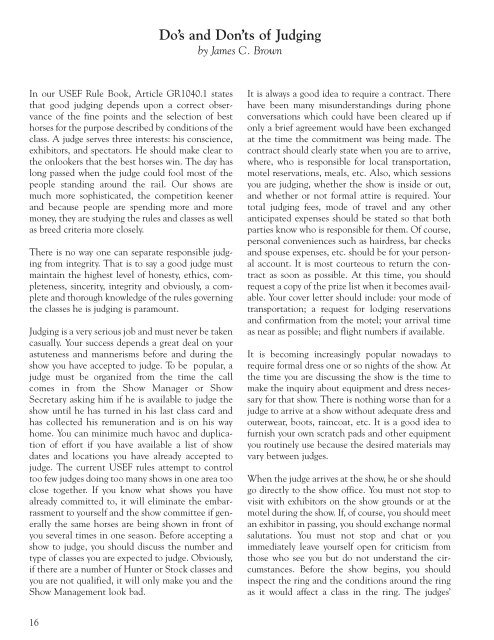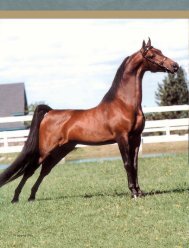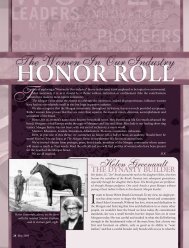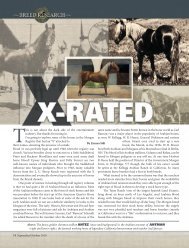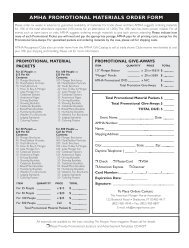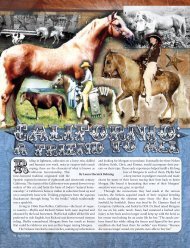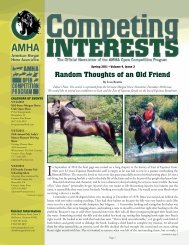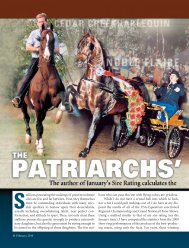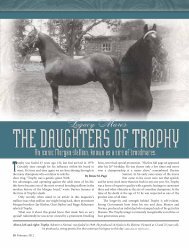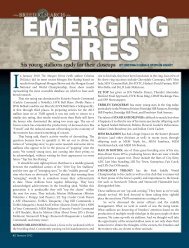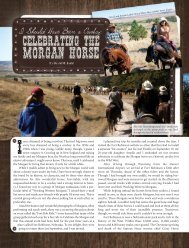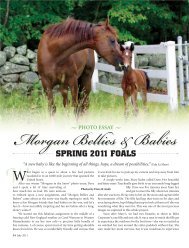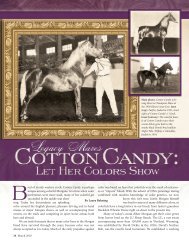Judging School Handbook - American Morgan Horse Association
Judging School Handbook - American Morgan Horse Association
Judging School Handbook - American Morgan Horse Association
You also want an ePaper? Increase the reach of your titles
YUMPU automatically turns print PDFs into web optimized ePapers that Google loves.
Do’s and Don’ts of <strong>Judging</strong>by James C. BrownIn our USEF Rule Book, Article GR1040.1 statesthat good judging depends upon a correct observanceof the fine points and the selection of besthorses for the purpose described by conditions of theclass. A judge serves three interests: his conscience,exhibitors, and spectators. He should make clear tothe onlookers that the best horses win. The day haslong passed when the judge could fool most of thepeople standing around the rail. Our shows aremuch more sophisticated, the competition keenerand because people are spending more and moremoney, they are studying the rules and classes as wellas breed criteria more closely.There is no way one can separate responsible judgingfrom integrity. That is to say a good judge mustmaintain the highest level of honesty, ethics, completeness,sincerity, integrity and obviously, a completeand thorough knowledge of the rules governingthe classes he is judging is paramount.<strong>Judging</strong> is a very serious job and must never be takencasually. Your success depends a great deal on yourastuteness and mannerisms before and during theshow you have accepted to judge. To be popular, ajudge must be organized from the time the callcomes in from the Show Manager or ShowSecretary asking him if he is available to judge theshow until he has turned in his last class card andhas collected his remuneration and is on his wayhome. You can minimize much havoc and duplicationof effort if you have available a list of showdates and locations you have already accepted tojudge. The current USEF rules attempt to controltoo few judges doing too many shows in one area tooclose together. If you know what shows you havealready committed to, it will eliminate the embarrassmentto yourself and the show committee if generallythe same horses are being shown in front ofyou several times in one season. Before accepting ashow to judge, you should discuss the number andtype of classes you are expected to judge. Obviously,if there are a number of Hunter or Stock classes andyou are not qualified, it will only make you and theShow Management look bad.It is always a good idea to require a contract. Therehave been many misunderstandings during phoneconversations which could have been cleared up ifonly a brief agreement would have been exchangedat the time the commitment was being made. Thecontract should clearly state when you are to arrive,where, who is responsible for local transportation,motel reservations, meals, etc. Also, which sessionsyou are judging, whether the show is inside or out,and whether or not formal attire is required. Yourtotal judging fees, mode of travel and any otheranticipated expenses should be stated so that bothparties know who is responsible for them. Of course,personal conveniences such as hairdress, bar checksand spouse expenses, etc. should be for your personalaccount. It is most courteous to return the contractas soon as possible. At this time, you shouldrequest a copy of the prize list when it becomes available.Your cover letter should include: your mode oftransportation; a request for lodging reservationsand confirmation from the motel; your arrival timeas near as possible; and flight numbers if available.It is becoming increasingly popular nowadays torequire formal dress one or so nights of the show. Atthe time you are discussing the show is the time tomake the inquiry about equipment and dress necessaryfor that show. There is nothing worse than for ajudge to arrive at a show without adequate dress andouterwear, boots, raincoat, etc. It is a good idea tofurnish your own scratch pads and other equipmentyou routinely use because the desired materials mayvary between judges.When the judge arrives at the show, he or she shouldgo directly to the show office. You must not stop tovisit with exhibitors on the show grounds or at themotel during the show. If, of course, you should meetan exhibitor in passing, you should exchange normalsalutations. You must not stop and chat or youimmediately leave yourself open for criticism fromthose who see you but do not understand the circumstances.Before the show begins, you shouldinspect the ring and the conditions around the ringas it would affect a class in the ring. The judges’16


